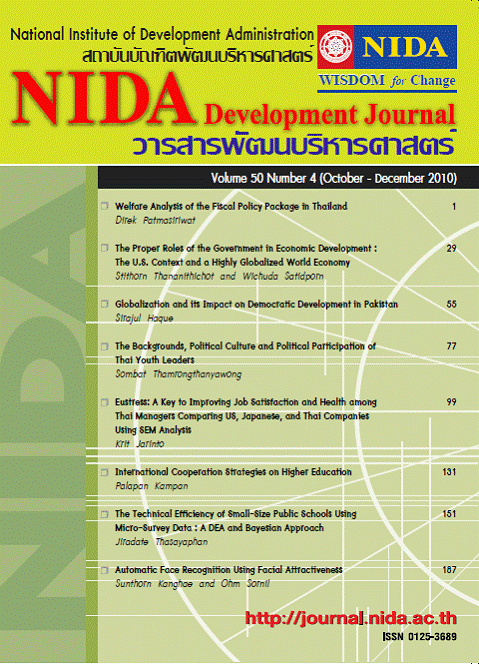International Cooperation Strategies on Higher Education
Keywords:
Strategies on Higher EducationAbstract
International cooperation strategies in higher education were collected and synthesized using in-depth interviews and brainstorming (workshops and focus groups) with target groups, including experts, public and private university administrators, foreign students studying in Thailand, Thai students studying overseas, and lecturers in exchange programs. The higher education policies and country development plans are also analyzed in order to examine the possibilities for higher education cooperation within bilateral and multilateral contexts. The cooperation strategies in higher education between Thailand and other countries are as follows.
The international cooperation strategies in higher education at the macro level aim at strengthening and increasing the efficacy of Thai higher education so as to become a hub of education at the regional and international level, which will result in the growth of the education business and provide a source of income : 1) Thailand would become a hub of higher education in the Greater Mekong Sub-region (GMS) within the next 10 years (2007-2016); 2) Thailand would become a regional higher education hub in the Association of South-East Asian Nations (ASEAN) within the next 20 years (2007-2026); 3) Thailand would be able to earn 8,000 million baht from the higher education business within the next 20 years (2006).
In order to achieve this goal, the important strategies include improving the quality of Thai higher education, supporting higher education cooperation to meet international standards, facilitating regulations for international cooperation and development, advertising Thai higher education for better international cooperation, and enhancing the higher education market in Thailand. Moreover, the cooperation strategies of higher education at the bilateral, multilateral, and international level should be included, for example, the cooperation strategies between Thailand and the Southeast Asia Region, the cooperation strategies between Thailand and the East Asia Region, the cooperation strategies between Thailand and the Asia Pacific Region, the cooperation strategies between Thailand and North America, the cooperation strategies between Thailand and Europe, the cooperation strategies between Thailand and South Asia, the cooperation strategies between Thailand and the Middle East, the cooperation strategies between Thailand and South America, and the higher education cooperation at the multilateral level.
การสังเคราะห์ยุทธศาสตร์ความร่วมมือด้านอุดมศึกษากับต่างประเทศ โดยใช้ข้อมูลที่รวบรวมได้จากผู้ทรงคุณวุฒิ ผู้บริหารสถาบันอุดมศึกษาทั้งภาครัฐและเอกชน กลุ่มนักศึกษานานาชาติที่มาศึกษาในประเทศไทย นักศึกษาไทยในต่างประเทศ อาจารย์ในโครงการแลกเปลี่ยนระหว่างประเทศ และผู้บริหารหน่วยงานที่เกี่ยวข้อง ประมวลเข้ากับนโยบายอุดมศึกษาของประเทศและนโยบายการพัฒนาประเทศ ที่มีความเชื่อมโยงกัน รวม ไปถึงการวิเคราะห์โอกาสการสร้างความร่วมมือด้านอุดมศึกษาในระดับพหุภาคี และทวิภาคี ทำให้ได้ยุทธศาสตร์การสร้างความร่วมมือด้านอุดมศึกษากับต่างประเทศที่เหมาะสมสำหรับประเทศไทย ดังนี้
วิสัยทัศน์ของยุทธศาสตร์ความร่วมมือด้านอุดมศึกษาไทยกับต่างประเทศในภาพรวม เน้นที่การสร้างความเข้มแข็งและเพิ่มขีดความสามารถของอุดมศึกษาไทยให้เป็นศูนย์กลางอุดมศึกษาของภูมิภาค และได้รับการยอมรับจากนานาชาติ โดยกำหนดเป้าหมายไว้ 3 ประการคือ
1) ทำให้ประเทศไทยเป็นศูนย์กลางอุดมศึกษาของกลุ่มประเทศอนุภูมิภาคลุ่มแม่น้ำโขง (GMS) ภายใน 10 ปี (พ.ศ. 2550-2559)
2) ทำให้ประเทศไทยเป็นศูนย์กลางอุดมศึกษาของภูมิภาคอาเซียน ภายใน 20 ปี (พ.ศ. 2550-2569)
3) ทำให้ประเทศไทยมีรายได้จากธุรกิจอุดมศึกษาไม่ต่ำกว่าปีละ 8,000 ล้านบาท ภายใน 20 ปี (พ.ศ. 2569)
กลยุทธ์ที่สำคัญในการทำให้เป้าหมายตามยุทธศาสตร์ภาพรวมไปสู่ความสำเร็จ ได้แก่ การเพิ่มขีดความสามารถของสถาบันอุดมศึกษาไทย การสร้างความร่วมมือเพื่อยกระดับอุดมศึกษาไทยสู่มาตรฐานสากล การดำเนินความร่วมมือเชิงรุกในการสร้างความร่วมมือกับต่างประเทศ การปรับกฎระเบียบให้เอื้ออำนวยต่อการพัฒนาความร่วมมือระหว่างประเทศ การสร้างจุดขายของอุดมศึกษาไทยเพื่อโอกาสการระดมความร่วมมือระหว่างประเทศ และการขยายโอกาสทางการตลาดของธุรกิจอุดมศึกษาไทย
นอกจากนี้ ยังมียุทธศาสตร์ความร่วมมือด้านอุดมศึกษากับต่างประเทศในเวที พหุภาคีและในเวทีขององค์กรระหว่างประเทศ เพื่อเสริมสร้างให้ยุทธศาสตร์รวมบรรลุเป้าหมายได้อย่างมีประสิทธิภาพยิ่งขึ้น ได้แก่ ยุทธศาสตร์ความร่วมมือกับภูมิภาคเอเชียตะวันออกเฉียงใต้ ยุทธศาสตร์ความร่วมมือกับภูมิภาคเอเชียตะวันออก ยุทธศาสตร์ความร่วมมือกับภูมิภาคแปซิฟิก ยุทธศาสตร์ความร่วมมือในภูมิภาคอเมริกาเหนือ ยุทธศาสตร์ความร่วมมือกับภูมิภาคยุโรป ยุทธศาสตร์ความร่วมมือกับภูมิภาคเอเชียใต้ ยุทธศาสตร์ความร่วมมือกับภูมิภาคเอเชียตะวันออกกลาง ยุทธศาสตร์ความร่วมมือในภูมิภาคอเมริกาใต้ และยุทธศาสตร์ความร่วมมือในเวทีขององค์การระหว่างประเทศ




